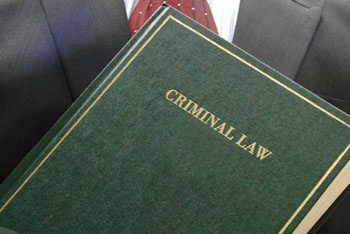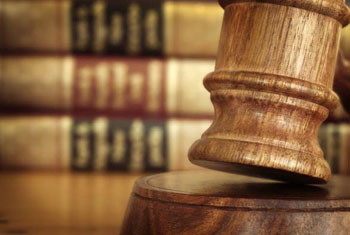Canada’s Legal System: Difference between revisions
| Line 10: | Line 10: | ||
'''Civil law''' deals with all other legal issues, like having a contract with someone or buying property. Family law is another kind of civil law. The purpose of civil law is to make sure that we are fair in our dealings with each other. | '''Civil law''' deals with all other legal issues, like having a contract with someone or buying property. Family law is another kind of civil law. The purpose of civil law is to make sure that we are fair in our dealings with each other. | ||
== | ==Courts apply the laws== | ||
Courts exist to provide a way to apply the laws in a fair and rational manner. Courts have a variety of functions. For example, they enforce criminal law and they resolve civil law disagreements among people. | |||
Two very important principles are fundamental to the Canadian court system: | Two very important principles are fundamental to the Canadian court system: | ||
*the courts are separate from government | * the courts are separate from government | ||
*judges are independent | * judges are independent | ||
===The courts are separate from government=== | ===The courts are separate from government=== | ||
In Canada, the courts are separate from the government. This arrangement is often called "a separation of powers." | |||
The courts decide how the laws that are made by the government apply to individuals in everyday situations. A key purpose of the courts is to protect the rights and freedoms of everyone in Canada. | |||
The courts decide how the laws that are made by government apply to individuals in everyday situations. | |||
everyone in Canada. | |||
When judges make a decision in court, they apply the law made by our elected representatives. They are also guided by what other judges have decided in previous similar cases. | When judges make a decision in court, they apply the law made by our elected representatives. They are also guided by what other judges have decided in previous similar cases. | ||
===Judges are independent=== | ===Judges are independent=== | ||
In Canada, judges are free to make decisions without interference or influence from any source, including government. | In Canada, judges are free to make decisions without interference or influence from any source, including government. | ||
It is our constitutional right to have our legal issues decided by a fair decision-maker. Judges have a responsibility to listen to both sides of a case and then to make fair decisions based on the law | It is our constitutional right to have our legal issues decided by a fair, independent decision-maker. Judges have a responsibility to listen to both sides of a case and then to make fair decisions based on the law, the facts, and the evidence before them. | ||
If a judge felt pressure from the government or anyone else to decide a case in a particular way, the result would be unfair. The rights of individual citizens would not be protected. | If a judge felt pressure from the government — or anyone else — to decide a case in a particular way, the result would be unfair. The rights of individual citizens would not be protected. | ||
==Courts in British Columbia== | ==Courts in British Columbia== | ||
Revision as of 15:36, 22 April 2022
In this section, you will learn the role courts and tribunals play in applying Canada's laws.
Two kinds of law: Criminal law and civil law[edit]

Broadly speaking, laws in Canada fall into two categories: criminal law or civil law.
Criminal law deals with crimes, like assault or theft. The Criminal Code is the main law setting out what amounts to a crime and how it should be dealt with. This law is the same all across Canada. The purpose of criminal law is to make sure people stay safe and secure. If someone is charged and found guilty of a crime, they face legal consequences ranging from a discharge, to a fine, to time in jail.
Civil law deals with all other legal issues, like having a contract with someone or buying property. Family law is another kind of civil law. The purpose of civil law is to make sure that we are fair in our dealings with each other.
Courts apply the laws[edit]
Courts exist to provide a way to apply the laws in a fair and rational manner. Courts have a variety of functions. For example, they enforce criminal law and they resolve civil law disagreements among people.
Two very important principles are fundamental to the Canadian court system:
- the courts are separate from government
- judges are independent
The courts are separate from government[edit]
In Canada, the courts are separate from the government. This arrangement is often called "a separation of powers."
The courts decide how the laws that are made by the government apply to individuals in everyday situations. A key purpose of the courts is to protect the rights and freedoms of everyone in Canada.
When judges make a decision in court, they apply the law made by our elected representatives. They are also guided by what other judges have decided in previous similar cases.
Judges are independent[edit]
In Canada, judges are free to make decisions without interference or influence from any source, including government.
It is our constitutional right to have our legal issues decided by a fair, independent decision-maker. Judges have a responsibility to listen to both sides of a case and then to make fair decisions based on the law, the facts, and the evidence before them.
If a judge felt pressure from the government — or anyone else — to decide a case in a particular way, the result would be unfair. The rights of individual citizens would not be protected.
Courts in British Columbia[edit]
In BC there are three levels of court:
Provincial Court of British Columbia[edit]

The Provincial Court is the first level of court. The Provincial Court hears most cases about criminal law matters. It also hears cases involving young offenders who have been charged with committing a crime.
The Provincial Court also has several parts that hear cases about civil law matters:
- Family law cases are heard in Family Court (but not divorce or division of property used by the family; those are heard in Supreme Court).
- Cases about smaller amounts of money (up to $25,000) are heard in Small Claims Court.
- Cases that involve traffic offences are heard in Traffic Court.
BC Supreme Court[edit]
The BC Supreme Court has jurisdiction over most legal cases. It hears:
- serious criminal cases,
- civil cases involving large amounts of money,
- family cases that are about divorce or dividing property owned by the family, and
- appeals of cases from the Provincial Court.
Court of Appeal for British Columbia[edit]
If someone does not agree with the decision from their trial in the BC Supreme Court, they may be able to appeal their case to the Court of Appeal for British Columbia. Usually, three judges from the Court of Appeal will hear the appeal.
Federal Courts[edit]
The federal court system is separate from the provincial court system. The Federal Court can only deal with some cases that involve the rights of all Canadians, like citizenship, and cases that involve an organization owned by the Government of Canada.
An appeal from the Federal Court goes to the Federal Court of Appeal, then to the Supreme Court of Canada.
Citizenship Court of Canada[edit]
This court examines all applications for Canadian citizenship. The judges of the Citizenship Court may interview permanent residents who apply to become Canadian citizens. The Citizenship Court has citizenship ceremonies for new Canadians.
Supreme Court of Canada[edit]
The Supreme Court of Canada in Ottawa is the highest court in Canada. It hears appeals from all other courts in Canada. There is no appeal from a decision made by the Supreme Court of Canada.
Tribunals[edit]
Tribunals hear disputes about government rules or regulations. Tribunals are like courts but are not part of the court system. Tribunals are less formal than courts.
At the tribunal, each side has a chance to present its case and the decision-maker makes the decision. The decision-maker, also called an adjudicator, is someone with specialized knowledge. The decision-maker may be a judge or may be someone who is an expert in a specialized area of law.
Here are some examples of the issues where you can use a tribunal to resolve your dispute:
- disability benefits,
- employment insurance,
- human rights claims,
- landlord tenant matters, and
- refugee claims.
| This information applies to British Columbia, Canada. Last reviewed for legal accuracy by People's Law School, 2013. |
| |||||||||||||||||||||||||||||

